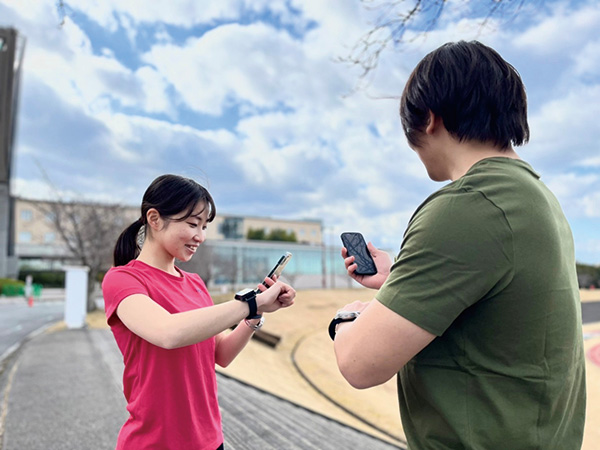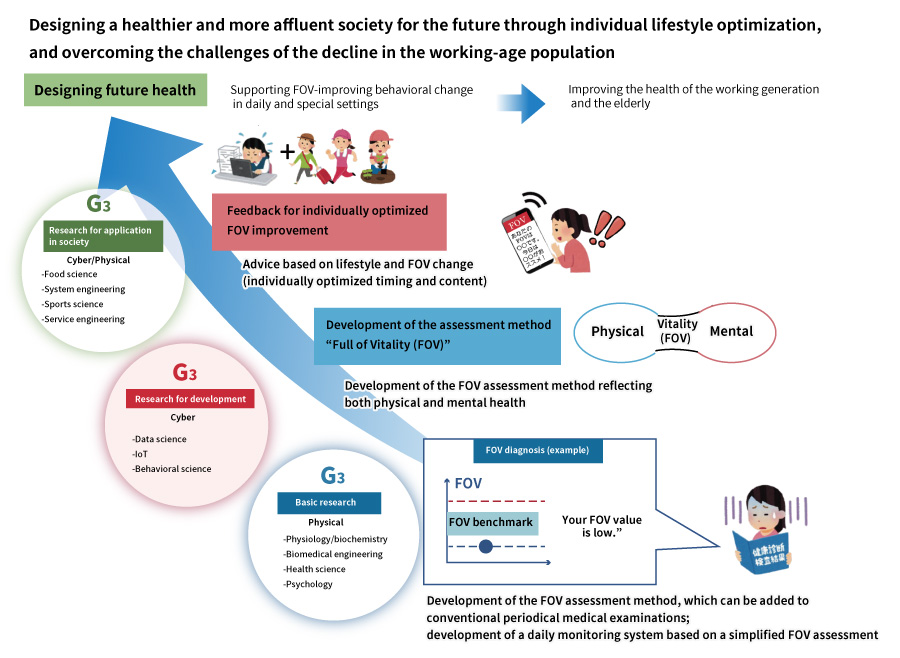Research AreaⅢ Overcoming the decline in the working-age populationDiffusion of Precision Healthcare in Society
Building an individually optimized precision healthcare system to stop the decline in the working-age population
Leaders
-
-
-
Group leaderHideyuki TakadaProfessor, Department of Information Science and Engineering, College of Information Science and EngineeringProfile
-
Group leaderMasayoshi IshidaProfessor, Department of Gastronomy Management, College of Gastronomy ManagementProfile
R-GIRO dedicated researcher
Visualizing individual mental and physical health condition and developing a system that prompts people to adopt healthier behavior
Japan is one of the world's leading super-aging societies. Some estimates indicate that the super-aging trend will continue until 2060 even if the elderly population begins to decrease in the near future, suggesting a threat to national finances due to a downturn in the economy deriving from lower labor productivity caused by population shrinkage and from increased medical and nursing care costs reflecting people’s poor health. While it is often said that the “the 100-year life” has arrived, the reality is that there is a gap of over 10 years between the country’s average life expectancy and healthy life expectancy. It is therefore imperative that people modify their behavior to maintain and enhance their health if Japan is to achieve economic recovery and improve labor productivity.
To improve people’s health, the Japanese government has already taken various policy measures designed to entice people to adopt healthy habits, such as the institution of specially designated medical examinations, the Health Promotion Act, and "Health Japan 21 (the third term)". However, the 2019 National Health and Nutrition Survey results indicate that only small percentages of men and women do regular physical exercise and keep a healthy diet, which are essential for good health. This tendency has not improved much in more than a decade, which is particularly noticeable in the working generation. This age group has not changed much in terms of health-related behavior, despite the promotion of health-conscious management and healthy working styles by many companies and more flexible time for employees. We launched this research project with an acute awareness of this problematic situation.
Although fully aware of the importance of physical exercise and a balanced diet for health, many people are unable to acquire these habits for some reason. To get such people to adopt healthy behaviors, it is necessary to instill in them an interest in it and a desire for self-improvement, that is, induce motivation and willingness. In this project, therefore, we are developing an information feedback system that visualizes individual physical and mental condition through short-term (daily) and long-term monitoring profiles while prompting individually optimized, lifestyle-adjusted behavioral change in both daily and non-daily situations. We will thus introduce an individually optimized precision health care system in society to help people maintain and enhance their health. The project focuses specifically on the current working generation so as to enable them to continue working in their old age and increase the number of people with vitality and a willingness to work.
Developing an assessment method and a feedback system to establish a precision health care system in society
To prompt individually optimized behavioral change, it is necessary to assess individual condition (in terms of vitality) and then make proposals at an appropriate timing and with appropriate content. To do so, we are pursuing this project in three groups, focused on basic research concerning individual condition assessment, the development of methods to promote behavioral change, and practical application in society, respectively.
Firstly, the Murakami Group is developing a new method to assess vitality in a unit called “Full of Vitality (FOV),” which reflects an individual’s physical and mental condition. To develop this assessment method, a battery of biological information measurable from blood, urine, saliva, feces, heart rate, blood pressure, body temperature, and so on is collected; biomarkers that can be used for the objective assessment of health condition are identified; and indices for “FOV,” assessment are developed using these variables. One major characteristic of this index is that assessment indices cover both physical and mental condition. Most health assessment systems have thus far been designed to evaluate physical and mental condition separately, with the latter mostly relying on subjective data and no objective criteria. In the project, we hope to overcome these shortcomings by developing completely novel assessment indices and methods integrating physical and mental elements. Moreover, we will search for a simple, quick-acting, and minimally invasive assessment method so that people can use it on a daily basis.
Secondly, the Takada Group is mainly working on the development of a feedback system that provides information that is individually optimized in terms of both timing and content to prompt individual users to change their behavior to improve their FOV. Types of healthy behavior that improve FOV and types of feedback that motivate people to change their behavior differ from one individual to another. Therefore, based on the FOV indices and lifelog data to be developed by the Murakami Group and using machine learning and other such techniques, the healthy behavior that is effective in improving each individual’s FOV will be identified, and parameters that lead to the desired behavioral change will be extracted. Using these parameters, short-term and long-term physical and mental conditions will be predicted based on FOV data and life log data collected on a daily basis, thus perfecting a feedback system that provides individually optimized information at individually optimized timing to prompt individual users to change their behavior.
Thirdly, the Ishida Group is in charge of applying the research results of the Murakami and Takada Groups in real-life settings to verify their effectiveness. The group will establish methods to help people change their behavior in their daily lives and improve their FOV through specially organized events, and conduct demonstrative research, starting with a method to assist people in improving and maintaining their FOV through regular physical exercise and healthy eating habits. Possible ways to do this include, for example, linking the creation and implementation of leisure activities with healthy behavior, promoting further behavioral change with FOV-based feedback, suggestions of nutritionally balanced menus, and support for physical exercise.
The group will also design venues and methods for FOV improvement through special events, which the group will design, not as stand-alone events producing only transient effects but in such a way as to lead to lasting daily behavioral change relating to physical exercise and diet. Demonstrative experiments will be conducted with local residents at Ritsumeikan University’s Biwako-Kusatsu Campus and longevity district residents to verify the effectiveness of the above for practical application in society at large. Experiment results will be shared with the other groups for further improvement.
New assessment method and system integrating physical and mental health, with an eye to industrial application and community use
This research project is uniquely characterized by the development of an assessment method and feedback system that integrate physical and mental conditions by processing information on physical and mental health simultaneously. Fusing research by the three groups representing different areas of specialization, we intend to open up a new area of academic research on behavioral change, namely, individually optimized behavioral support (precision healthcare).
Another major and rare characteristic of this project is its scope, stretching from basic research to development and practical implementation in society. In the future, this project can be expanded to the development of FOV-improving smartphone apps with corporate partners, regional and industrial promotion through health tourism featuring natural attractions and local produce, and other new value-creating initiatives in collaboration with local communities.
Furthermore, through this project that provides the opportunity for interdisciplinary research, we are hoping to take part in the training of young researchers who can address future health challenges in society by working beyond their sphere of specialization.
Finally, we are convinced that this project can contribute to realizing not only longer healthy life expectancy but also longer working-age life expectancy, protecting people’s health in the future, and overcoming the challenges of the decline in the working-age population.

Checking physical and mental condition with a wearable device

Research results envisaged in the project
077-561-3488 (9:00-17:30 on weekdays)
072-665-2570 (9:00-17:30 on weekdays)
075-465-8224 (9:00-17:30 on weekdays)
